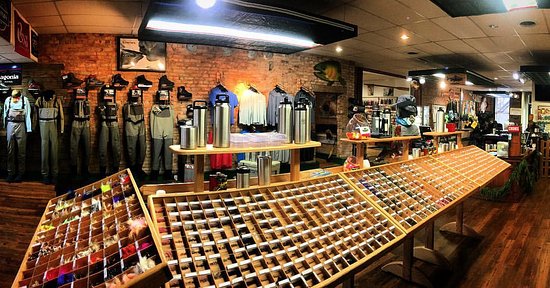By Patrick Straub EBS CONTRIBUTOR
I first visited a fly shop when I was 6 years old. My dad was taking me to fish the Yellowstone River during the salmon fly hatch. We were in a rush since we didn’t want to waste time getting to the river, but we definitely had to stop at a fly shop—they would know the best float and exactly where the big bugs were last spotted.
We walked past the storefront where the owner’s fly tying business was housed and took a few minutes to watch a handful of well-skilled women furiously tying flies. Once in the shop my dad headed straight to the large collection of fly bins, first asking which dry flies we should have. We paid cash and were out the door faster than you could say “two-fly nymph rig.”
Today, with the abundance of digital media available anglers can order flies and have them delivered to their door, check reports from their couch and even book a vehicle shuttle while on the toilet. It is possible to spend a full day on the river without visiting a local fly shop…
But why in the heck would you want to do that?
Here are the five top reasons your local fly shop is essential.
Knowledge
This can never be understated. No better source for current information exists than from the crew standing behind the counter. Staff, guides and customers are on the water nearly every day, and providing accurate information is a key part of a fly shop’s success. The savvy fly shops have plenty of ways to get information in front of their customers—video reports, email blasts and more. But for fly shops to provide that technology it costs them staff time, so if you are a regular viewer of their content, be sure to visit and buy some of the flies they are pitching in their videos. Don’t just watch the video then go click on the online discount store; Visit a shop in person and spend a little money.
Local conservation projects
Whether they openly say it or not, your local fly shops are constantly involved in conservation projects that benefit your home waters. From donated items to auctions to giving up staff and guides for donated trips, nearly every local fly shop in our area gives back to the resources that provide for them. Some definitely participate more than others, so learn which ones those are and support them.
River clean-up days
Most rivers in our area have organized “clean-up days,” when people dedicate a day to pick up trash and other detritus from a local river. Fly shops play a large role in providing volunteer time or help with spreading the word. Some even offer prizes or gift cards for whomever picks up the most trash.
Try before you buy
When choosing to make a large purchase like waders or a fly rod, no better way exists than to try on waders or cast a wide array of fly rods. These purchases are investments in the future enjoyment of your fishing trips. With the selections available locally, you can probably try on or test-cast most every rod, wader or wading boot available today.
Dollars spent locally stay local
Since most, if not all, of our local fly shops are owned by people who live and work in the community, the money spent at their businesses gets put back into local economies—not shareholder accounts or board member slush funds.
The days of ladies tying flies in storefronts may be over, but if you can remember—and name that first fly shop I visited—you’re probably one of those anglers who doesn’t need to be reminded of the value of visiting a local fly shop.
If you don’t know the name of that fly shop, log out of Tik-Tok and visit your local shop. And if still you don’t want to visit a local fly shop you can always stay home and organize your collection of strike indicators.
Patrick Straub has fished on five continents. He is the author of six books, including “Everything You Always Wanted to Know About Fly Fishing” and has been writing the Eddy Line for nine years. He was one of the largest outfitters in Montana, but these days he now only guides anglers who value quality over quantity. If you want to fish with him, visit his website, https://www.dryflymontana.com/.












